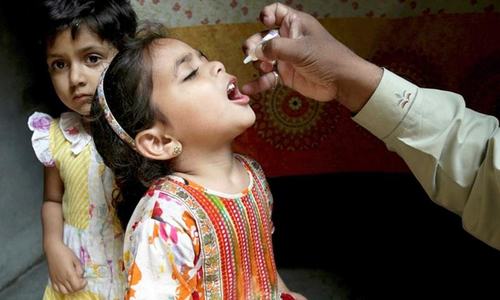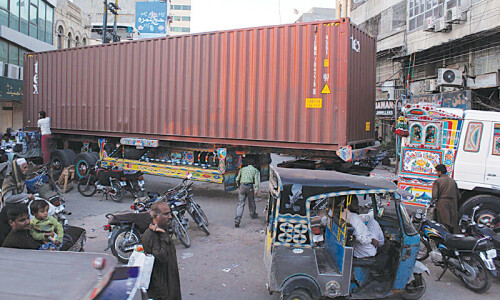ISLAMABAD: While the National Polio Programme plans to vaccinate over 40 million children up to five years of age during the coming campaign, Special Assistant to the Prime Minister (SAPM) Dr Faisal Sultan announced on Wednesday that the government would seek cooperation from the provinces to thrash out a strategy to eradicate the virus.
The SAPM said on his first visit to the National Emergency Operation Centre (NEOC) the government was determined to eradicate the virus and considered polio workers as national heroes.
Amer Ashraf Khuwaja, secretary to the Ministry of National Health Services (NHS), was also present on the occasion.
Dr Sultan appreciated the cooperation extended by the international community and vowed to make the country free of polio.
Read: 16 reasons we need to end polio in Pakistan
Dr Sultan stressed the need to motivate all segments of society to play their part in eradication of poliovirus. He emphasised that without the continued support of parents, a polio-free Pakistan could not be achieved.
Dr Faisal rules out a polio-free Pakistan without parents’ continued support
Dr Rana Safdar, the NEOC coordinator for polio, informed the SAPM that the polio campaigns remained suspended due to Covid-19 for four months.
“However, we conducted successful campaigns in July and August. The proof of our success is that all segments of society are now cooperating for eradication of the crippling disease,” he said.
“A nationwide polio campaign will be held during the current month and we have been planning to vaccinate as many as 40m children across the country,” Dr Safdar said.
The programme aims to vaccinate 40m children under the age of five in the next campaign scheduled to start on Sept 21. It will utilise a workforce of almost 270,000 across all provinces.
Dr Safdar told Dawn that the anti-polio drive suffered a setback in April last year when some elements allegedly staged a ruse to stop polio vaccination. But it had been a smooth sailing since then as a door-to-door vaccination drive was carried out in December last year and in February.
“After a four-month Covid-19 pause, we resumed door-to-door vaccination in July (169 high risk UCs targeting 760,000 children), followed by sub-national August campaign in 130 districts vaccinating over 31m children.”
WHO guidelines
The World Health Organisation (WHO) has published guidelines for clinicians and healthcare decision-makers on the use of corticosteroids for patients with Covid-19.
“We recommend systemic corticosteroids for the treatment of patients with severe and critical Covid-19. We suggest corticosteroids be not used for the treatment of patients with non-severe Covid-19,” it stated.
Corticosteroids are listed in the WHO model list of essential medicines which are readily available globally at low prices.
This guidance was developed in collaboration with a non-profit organisation, Magic Evidence Ecosystem Foundation (MAGIC).
“Work on this guidance began on June 22 when the recovery trial published a preliminary report on the impact of corticosteroids.
“To supplement the results, WHO partnered with investigators of seven trials on corticosteroids to conduct a meta-analysis of these trials, in order to rapidly provide additional evidence to build on recovery data and inform guidance development,” the WHO said.
Corticosteroids are a class of drugs which lower inflammation in the body. Because corticosteroids ease swelling, itching, redness and allergic reactions, doctors often prescribe them to help treat diseases like asthma, arthritis, lupus and allergies.
Published in Dawn, September 3rd, 2020















































